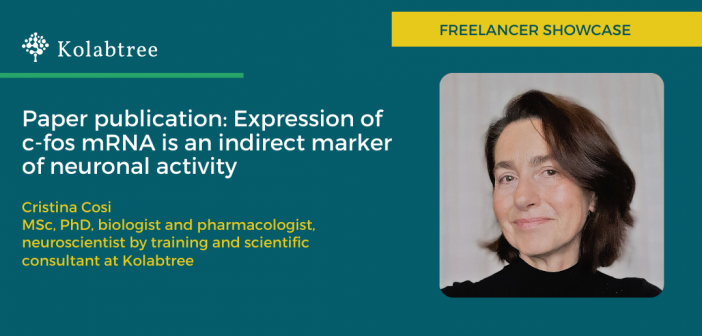The expression of the “immediate early gene” c-fos is an indirect marker of neuronal activity because c-fos is often expressed when neurons fire action potentials. c-fos mRNA expression is correlated to glutamatergic neurotransmission and has been studied extensively in psychopharmacology. RNAscope (ACD Bio) is a patented in situ mRNA detection technology (1) that uses branched DNA amplification and z paired probes to deliver a robust and specific assay, designed primarily for use on formalin fixed paraffin sections. The technology, adapted to frozen brain tissue sections, allowed the study of the modulation of c-fos expression in different neurocircuitries by a preferential D3 antagonist, potential antipsychotic, in mice treated with the NMDA glutamate receptor channel blocker MK-801 (2). The method and its validation are described in Cosi et al.,https://doi.org/10.1016/j.mex.2021.101348
[1] F. Wang, J. Flanagan, N. Su, L.-C. Wang, S. Bui, A. Nielson, X. Wu, H.-T. Vo, X.-J. Ma, Y. Luo, RNAscope®: A novel in situ RNA analysis platform for formalin-fixed paraffin-embedded tissues, J. Mol. Diagn. 14 (2012) 22–29, doi:10.1016/j.jmoldx.2011.08.002.
[2] C. Cosi, J.C. Martel, A.L. Auclair, G. Collo, L. Cavalleri, P. Heusler, L. Leriche, F. Gaudoux, P. Sokoloff, P.C. Moser, S. GattiMcArthur, Pharmacology Profile of F17464, a Dopamine D3 Receptor preferential Antagonist, Eur. J. Pharmacol. 890 (2021) 173635 https://doi.org/10.1016/j.ejphar.2020.173635.
About the author
Cristina Cosi, MSc, PhD, biologist and pharmacologist, neuroscientist by training, is freelance scientific consultant at Kolabtree.
She has dedicated her career to the understanding of the mechanisms of neuronal plasticity and to the discovery of drugs that could be beneficial against neurological (included Parkinson) and neuropsychiatric diseases and pain.








